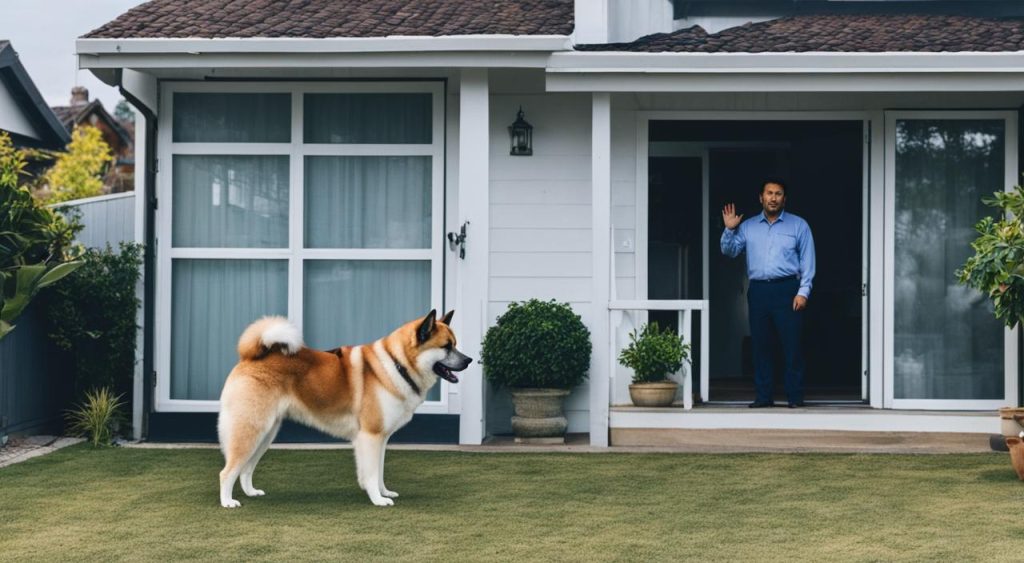Akitas are a popular breed of dog known for their loyalty and protective nature. However, potential owners need to be aware of the legalities surrounding Akita ownership in the United States. Due to their reputation for aggression, Akitas are subject to certain breed restrictions and regulations in many states and cities. In this article, we will explore the legal landscape of owning an Akita, including the laws, regulations, and considerations that potential owners should be aware of.
Key Takeaways:
- Many states in the US have either banned Akitas or placed heavy restrictions on their ownership due to their aggressive reputation.
- Understanding the legalities and breed restrictions is crucial for potential Akita owners.
- Akitas can still be legally owned in many states, but certain laws and regulations apply.
- Proper training, socialization, and responsible ownership play a significant role in preventing aggression and ensuring a well-behaved Akita.
- Researching and understanding the specific laws and restrictions in your state or city is essential before considering an Akita as a pet.
Why Akitas Are Considered Aggressive and How to Prevent Aggression
Akitas are known for their aggressive tendencies, which can be attributed to various factors. Understanding these factors is key to preventing aggression in your Akita and ensuring a harmonious relationship.
Factors Contributing to Akita Aggression
Several factors can contribute to Akita aggression, including their behaviors, resistance to training, and breed history. Akitas have a strong guarding instinct and may perceive unfamiliar people or animals as a threat. Additionally, their independent nature and high prey drive can make them prone to aggression if not properly trained and socialized.
Preventing Akita Aggression through Training and Socialization
To prevent aggression in Akitas, early training and consistent practice are crucial. Starting training at a young age helps Akitas develop good behavior patterns and understand their boundaries. Obedience training, focused on positive reinforcement techniques, can help Akitas learn to respond to commands and control their impulses.
Socialization is equally important for Akitas to ensure they are comfortable around unfamiliar people, animals, and environments. Exposing them to different situations, individuals, and other dogs helps them develop confidence and reduces their fear or anxiety, which can lead to aggression.
“Training and socialization are fundamental in preventing aggression in Akitas. Early intervention and consistent positive reinforcement play a vital role in shaping their behavior.”
It’s essential to provide a structured and disciplined environment for your Akita. Consistent boundaries, clear rules, and regular exercise are necessary to channel their energy and prevent frustration or boredom, which can contribute to aggression.
Remember, every Akita is unique, and some may have a higher predisposition to aggression. If you notice any signs of aggression, such as growling, biting, or excessive dominance, seek professional help from a dog behaviorist or trainer experienced in working with Akitas.
By understanding the factors contributing to Akita aggression and taking proactive measures through training and socialization, you can raise a well-behaved and non-aggressive Akita.
State and City Restrictions on Owning Akitas in the US
Akitas are subject to bans or heavy restrictions in numerous states across the United States, with certain cities implementing specific regulations as well. As part of breed-specific legislation and dog laws, the regulations surrounding Akitas can vary significantly from state to state and even within cities.
Some states have chosen to completely ban Akitas, while others have imposed various requirements on ownership. These requirements may include measures such as muzzling, signage, licensing, and even liability insurance for Akita owners. The purpose of these regulations is to ensure the responsible ownership and management of Akitas.
Therefore, if you are considering owning an Akita, it is crucial to thoroughly research and understand the specific laws and restrictions that apply in your state or city. This research will help you determine whether owning an Akita is feasible within the legal framework of your location.
Conclusion
Owning an Akita comes with certain legalities and responsibilities due to the breed’s reputation for aggression. While Akitas may be banned or restricted in some areas, they can still be kept as pets in many states. It is crucial for potential Akita owners to be aware of and comply with the laws and regulations surrounding Akita ownership.
Training and socialization are essential for Akitas to become well-behaved and non-aggressive family pets. Responsible ownership plays a significant role in preventing aggression and creating a harmonious environment for both the Akita and their human family. By providing the necessary training and socialization from an early age, an Akita can learn to be a loyal, loving, and well-behaved companion.
Despite their aggressive reputation, Akitas can make excellent family pets when properly trained, socialized, and responsibly owned. It is important to invest time, effort, and resources into their training to ensure they are obedient, respectful, and well-mannered. With the right guidance, an Akita can thrive in a loving and positive environment, becoming a cherished member of the family.





